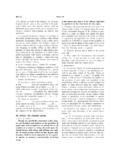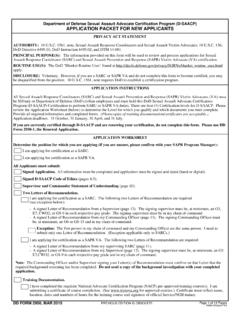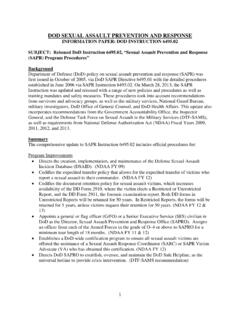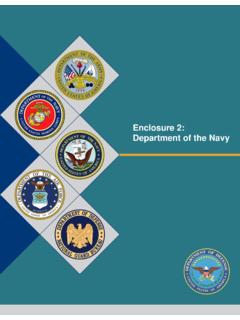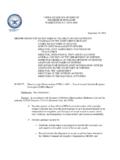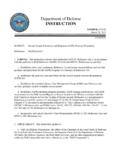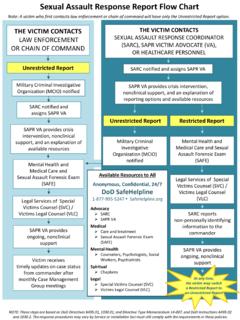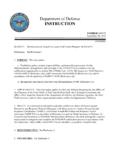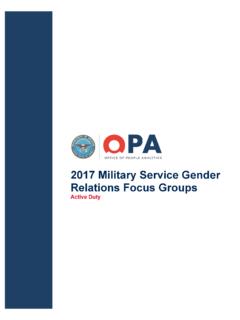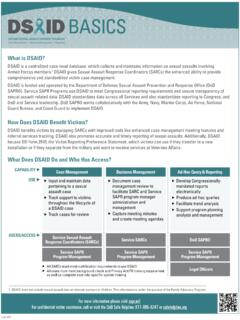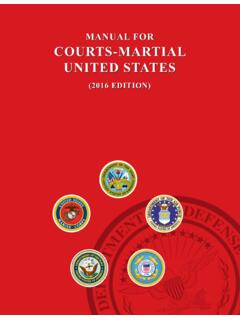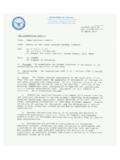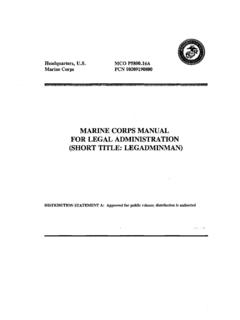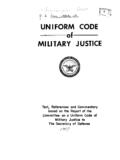Transcription of ANNEX Section 1 Part III of the Manual for Courts …
1 ANNEX Section 1. Part III of the Manual for Courts - martial , united states , is amended as follows: (a) 504 (c)(2)(D) is added to read as follows: (D) Where both parties have been substantial participants in illegal activity, those communications between the spouses during the marriage regarding the illegal activity in which they have jointly participated are not marital communications for purposes of the privilege in subdivision (b) and are not entitled to protection under the privilege in subdivision (b).
2 (b) 513(d)(2) is amended -- (1) to delete spouse abuse, child abuse, or and insert child abuse or of ; and (2) to delete the person of the other spouse or . (c) 514 is added to read as follows: Rule 514. Victim advocate - victim privilege (a) General rule of privilege. A victim has a privilege to refuse to disclose and to prevent any other person from disclosing a confidential communication made between the victim and a victim advocate, in a case arising under the UCMJ, if such communication was made for the purpose of facilitating advice or supportive assistance to the victim.
3 (b) Definitions. As used in this rule of evidence: 2 (1) A victim is any person who suffered direct physical or emotional harm as the result of a sexual or violent offense. (2) A victim advocate is a person who is: (A) designated in writing as a victim advocate; (B) authorized to perform victim advocate duties in accordance with service regulations, and is acting in the performance of those duties; or (C) certified as a victim advocate pursuant to Federal or State requirements.
4 (3) A communication is confidential if made to a victim advocate acting in the capacity of a victim advocate and if not intended to be disclosed to third persons other than: (A) those to whom disclosure is made in furtherance of the rendition of advice or assistance to the victim or (B) an assistant to a victim advocate reasonably necessary for such transmission of the communication. (4) An assistant to a victim advocate is a person directed by or assigned to assist a victim advocate in providing victim advocate services, or is reasonably believed by the victim to be such.
5 (5) Evidence of a victim s records or communications is testimony of a victim advocate, or records that pertain to communications by a victim to a victim advocate, for the purposes of advising or providing supportive assistance to the victim. 3 (c) Who may claim the privilege. The privilege may be claimed by the victim or any guardian or conservator of the victim. A person who may claim the privilege may authorize trial counsel or a defense counsel representing the victim to claim the privilege on his or her behalf.
6 The victim advocate who received the communication may claim the privilege on behalf of the victim. The authority of such a victim advocate, guardian, conservator, or a defense counsel representing the victim to so assert the privilege is presumed in the absence of evidence to the contrary. (d) Exceptions. There is no privilege under this rule: (1) when the victim is dead; (2) when Federal law, State law, or service regulation imposes a duty to report information contained in a communication.
7 (3) if the communication clearly contemplated the future commission of a fraud or crime or if the services of the victim advocate are sought or obtained to enable or aid anyone to commit or plan to commit what the victim knew or reasonably should have known to be a crime or fraud; (4) when necessary to ensure the safety and security of military personnel, military dependents, military property, classified information, or the accomplishment of a military mission; (5) when necessary to ensure the safety of any other person (including the victim) when a victim advocate believes that a victim s mental or emotional condition makes the victim a danger; or (6) when admission or disclosure of a communication is constitutionally required.
8 4 (e) Procedure to determine admissibility of victim records or communications. (1) In any case in which the production or admission of records or communications of a victim is a matter in dispute, a party may seek an interlocutory ruling by the military judge. In order to obtain such a ruling, the party shall: (A) file a written motion at least 5 days prior to entry of pleas specifically describing the evidence and stating the purpose for which it is sought or offered, or objected to, unless the military judge, for good cause shown, requires a different time for filing or permits filing during trial.
9 And (B) serve the motion on the opposing party, the military judge and, if practical, notify the victim or the victim s guardian, conservator, or representative that the motion has been filed and that the victim has an opportunity to be heard as set forth in subparagraph (e)(2). (2) Before ordering the production or admission of evidence of a victim s records or communication, the military judge shall conduct a hearing. Upon the motion of counsel for either party and upon good cause shown, the military judge may order the hearing closed.
10 At the hearing, the parties may call witnesses, including the victim, and offer other relevant evidence. The victim shall be afforded a reasonable opportunity to attend the hearing and be heard at the victim s own expense unless the victim has been otherwise subpoenaed or ordered to appear at the hearing. However, the proceedings shall not be unduly delayed for this purpose. In a case before a court - martial composed of a military judge and members, the military judge shall conduct the hearing outside the presence of the members.
